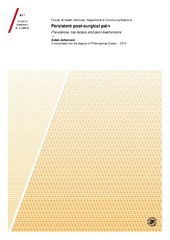| dc.contributor.advisor | Stubhaug, Audun | |
| dc.contributor.author | Johansen, Aslak | |
| dc.date.accessioned | 2015-10-22T11:22:30Z | |
| dc.date.available | 2015-10-22T11:22:30Z | |
| dc.date.issued | 2015-09-18 | |
| dc.description.abstract | Persistent pain is reported to be a frequent complication from surgery. Among the proposed risk factors are perioperative nerve injury and individual differences in pain sensitivity.
The 6th Tromsø Study, a cross-sectional survey and medical examination, provided questionnaire data on persistent pain in general and persistent pain following surgery in particular. Participants performed tests of sensitivity to experimental pain stimuli. A sample of participants who had performed surgery 3-36 months before the survey, were re-assessed with questionnaires and quantitative assessments of sensory function 15-32 months after Tromsø 6.
In accordance with previous research, we found that persistent pain after surgery was common. Moderate or severe pain in the area of surgery 3-36 months after the procedure was reported by
18.3 %. Most cases were coexistent with other chronic pain. Only in a small minority of cases did the patients themselves attribute persistent pain to surgery alone.
In a general surgical sample, we could not identify specific associations between persistent post-surgical pain and sensitivity to experimental pain stimuli when comorbid pain was adjusted for.
Persistent post-surgical pain was strongly associated with self-reported sensory disturbances, indicating possible nerve injury as a contributing factor. Sensory aberrations were confirmed with sensory testing in a majority of individuals with persistent pain in the surgical area. However, nerve injury does not appear sufficient for development of such pain, as signs of nerve injury, confirmed with quantitative sensory testing, were just as common among individuals without persistent post-surgical pain. | en_US |
| dc.description.doctoraltype | ph.d. | en_US |
| dc.description.popularabstract | I den 6. Tromsøundersøkelsen, en folkehelseundersøkelse i Tromsø kommune 2007-2008, svarte nesten 13.000 deltakere på spørsmål om langvarig smerte og kirurgi, og deres følsomhet for smerte ble undersøkt eksperimentelt. Et utvalg av deltakerne som hadde vært operert, ble fulgt opp 15-32 måneder senere med spørreskjema og undersøkelse av følsomhet for nøytrale og smertefulle stimuli.
Vi fant at 18,3 % rapporterte moderat til alvorlig smerte i operasjonsområdet 3-36 måneder etter kirurgi. Av disse hadde de fleste samtidig langvarig smerte av andre årsaker. Da vi justerte statistisk for bidraget fra annen langvarig smerte, fant vi ingen sammenheng mellom smerte etter kirurgi og smertefølsomhet.
Vi påviste en sterk statistisk sammenheng mellom langvarig smerte etter kirurgi og selvrapporterte forstyrrelser i følsomhet i operasjonsområdet. Dette kan indikere nerveskade som mulig bidragende årsak til smerten.
Med eksperimentelle metoder påviste vi imidlertid lokale endringer i følsomhet like hyppig hos individer med og uten langvarig smerte etter kirurgi. Nerveskade alene synes altså ikke å være tilstrekkelig som årsaksforklaring. | en_US |
| dc.description.sponsorship | This work was funded by The Norwegian Research Council, South-Eastern Norway Regional Health Authority, Northern Norway Regional Health Authority, and The Norwegian Health Association. | en_US |
| dc.description | The papers of this thesis are not available in Munin:<br>Paper I. Persistent postsurgical
pain in a general population: Prevalence and predictors in the Tromsø study. Johansen A, Romundstad L, Nielsen CN, Schirmer H, Stubhaug A. Available in <a href=http://dx.doi.org/10.1016/j.pain.2012.02.018> PAIN®, vol. 153, issue 7, 2012, pp. 1390–1396</a><br>Paper II. Persistent post-surgical pain and experimental pain sensitivity in the Tromsø study: Comorbid pain matters. Johansen A, Schirmer H, Stubhaug A, Nielsen CS. Available in <a href=http://dx.doi.org/10.1016/j.pain.2013.10.013> PAIN®, vol. 155, issue 2, 2014, pp. 341-348</a><br>Paper III. Persistent post-surgical pain and signs of nerve injury. The Tromsø Study. (Manuscript). | en_US |
| dc.identifier.uri | https://hdl.handle.net/10037/8222 | |
| dc.identifier.urn | URN:NBN:no-uit_munin_7804 | |
| dc.language.iso | eng | en_US |
| dc.publisher | UiT The Arctic University of Norway | en_US |
| dc.publisher | UiT Norges arktiske universitet | en_US |
| dc.relation.ispartofseries | ISM skriftserie; 159 | |
| dc.rights.accessRights | openAccess | |
| dc.rights.holder | Copyright 2015 The Author(s) | |
| dc.rights.uri | https://creativecommons.org/licenses/by-nc-sa/3.0 | en_US |
| dc.rights | Attribution-NonCommercial-ShareAlike 3.0 Unported (CC BY-NC-SA 3.0) | en_US |
| dc.subject | VDP::Medical disciplines: 700::Health sciences: 800::Epidemiology medical and dental statistics: 803 | en_US |
| dc.subject | VDP::Medisinske Fag: 700::Helsefag: 800::Epidemiologi medisinsk og odontologisk statistikk: 803 | en_US |
| dc.subject | VDP::Medical disciplines: 700::Clinical medical disciplines: 750::Anesthesiology: 765 | en_US |
| dc.subject | VDP::Medisinske Fag: 700::Klinisk medisinske fag: 750::Anestesiologi: 765 | en_US |
| dc.subject | VDP::Medical disciplines: 700::Health sciences: 800::Preventive medicine: 804 | en_US |
| dc.subject | VDP::Medisinske Fag: 700::Helsefag: 800::Forebyggende medisin: 804 | en_US |
| dc.subject | VDP::Medical disciplines: 700::Clinical medical disciplines: 750::General surgery: 780 | en_US |
| dc.subject | VDP::Medisinske Fag: 700::Klinisk medisinske fag: 750::Generell kirurgi: 780 | en_US |
| dc.subject | VDP::Medical disciplines: 700::Clinical medical disciplines: 750::Neurology: 752 | en_US |
| dc.subject | VDP::Medisinske Fag: 700::Klinisk medisinske fag: 750::Nevrologi: 752 | en_US |
| dc.subject | The Tromsø Study | |
| dc.subject | Tromsøundersøkelsen | |
| dc.title | Persistent post-surgical pain: Prevalence, risk factors and pain mechanisms | en_US |
| dc.type | Doctoral thesis | en_US |
| dc.type | Doktorgradsavhandling | en_US |


 English
English norsk
norsk



